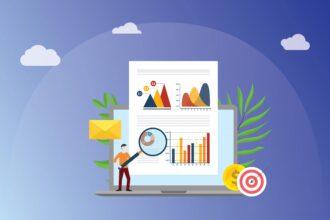Big data has become a highly invaluable aspect of modern business. More companies are using sophisticated data analytics and AI tools to overhaul their business models.
- E-commerce Companies Are Using Big Data Technology to Improve the Execution of their Marketing Strategies
Some industries have become more dependent on big data than others. The e-commerce sector has been one of the most affected by major advances in data technology. Smart e-commerce entrepreneurs are utilizing big data to address many of the problems they are facing. New advances in data technology have been especially beneficial for marketing.
E-commerce Companies Are Using Big Data Technology to Improve the Execution of their Marketing Strategies
The e-commerce sector is projected to spend over $6.2 billion on big data by 2025. This figure will continue to grow as more online retailers discover the benefits of using big data for various purposes, such as marketing.
E-commerce businesses have taken off ever since the pandemic pushed us back in our homes. From books, clothes, and shoes to courses and memberships, consumers are interacting with digital businesses more than ever. However, with more e-commerce stores popping up every day, it’s now important for you to invest in e-commerce marketing to not only acquire new customers but also retain them in the long run.
You simply can’t afford to ignore the benefits of using big data in this business. More e-commerce companies are leveraging analytics and AI to improve their business strategies.
Most ecommerce marketing strategies depend on your market, competitors, and your business goals. Here are five marketing strategies you need to use to grow your e-commerce store in 2022.
1. Use data to strengthen brand identity
The customer journey is the most important element of any e-commerce business. You can offer seamless customer engagement by leveraging the power of data. With data analytics, you can uncover insights about customers’ purchasing patterns, preferences, and habits. This knowledge helps you to improve the customer experience, drive sales, and strengthen your brand identity.
Data helps you stay on top of your game and keep your business ahead of the competition. By using the right data-driven marketing strategies, you can turn your value proposition into real-life benefits for your customers.
2. Leverage AI in SMS marketing
Marketing your online store is not an easy task. With more people turning to their mobile phones as an effective way to shop, focusing on SMS campaigns is a must. With the help of SMS marketing tools, you can reach out to a broader audience and get a higher response rate from the customers. You can send short messages about new arrivals, back-in-stock alerts, shipping updates, and many more.
This can be used for any online business and even offline ones. With SMS campaign software you can build customer loyalty, target specific demographics, and cut down on advertising costs.
AI technology has made SMS marketing a lot more effective. Marketers are using AI to refine their outreach strategies, assess the likelihood that their messages will be flagged as spam or phishing with risk scoring algorithms and ensure compliance with local regulations. AI and big data are making SMS marketing a lot more beneficial.
3. Use Analytics to Improve Google Ads and Google My Business Approaches
Digital marketing is now an integral part of the e-commerce business. As such, it is essential to create a Google-focused strategy that will help you generate more leads and conversions. You can optimize your website for search engines by investing in Google ads and setting up your Google My Business (GMB) profile. A well-optimized GMB profile creates trust, builds authority, and makes you visible in local SERPs.
For e-commerce businesses, the right ad campaign can increase the number of visitors to your website and boost the conversion rate. Data analytics technology can help them identify the practices that are working the best. This is especially true with Google Ads. Google Ads depend heavily on using big data to identify keywords and determine the content and landing pages that are converting the best.
4. Pick a payment processor that uses sophisticated analytics features
E-commerce business owners often struggle with payment gateways and currency conversions. This problem can be easily solved by partnering with a payment processor that has a strong network of payment gateways, allowing you to accept payments from almost any country in the world. While PayPal has been a leader in this space for quite some time, Stripe has quickly risen up to plug the gaps and facilitate more secure and faster payments. Paddle is another solid gateway that you should check out.
Analytics technology is going to be very important when you are working with a payment processor. You are going to want to make sure that you know how to use analytics to get the most bang for your buck.
5. Build a successful email newsletter campaign with analytics technology
In order to stand out in the competitive market, e-commerce businesses need to be more creative with their marketing strategy. Email newsletters are a great way to keep your customers engaged with your brand. The trick lies in creating content that is both informative and engaging. A well-designed email newsletter can boost the customer’s interest and improve conversions. In addition to this, emails also help create brand loyalty and increase your brand awareness.
Analytics technology is the basis for most modern email marketing strategies. You will need to use analytics features in your marketing automation platform to monitor countless KPIs, such as open rates, click-throughs and conversions.
Big Data is the Key to a Thriving E-Commerce Business
There are a lot of benefits of using big data in the e-commerce sector. You will have an easier time improving your ROI if you use it to your advantage. By following these tips, you’ll be able to supercharge your e-commerce business and set it up for success in 2022.










